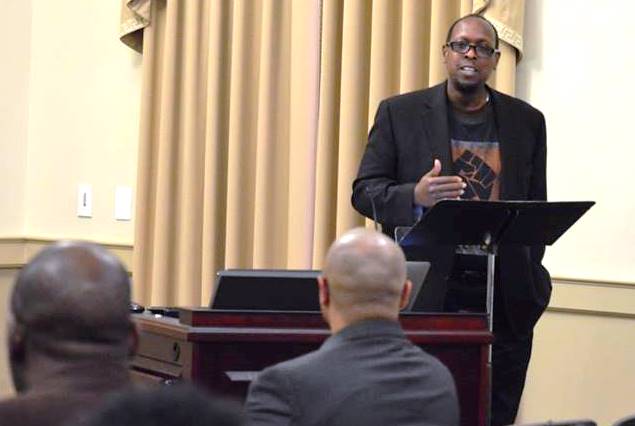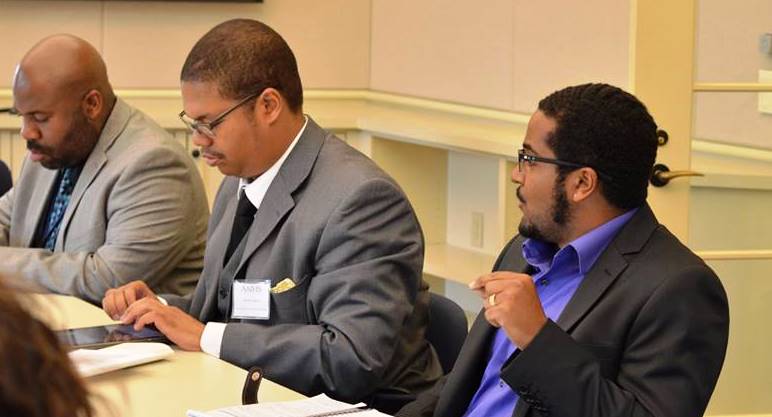#AAIHS2016: Reflecting on the Past’s Presence

Recently, I traveled to Chapel Hill for the first annual conference of the African American Intellectual History Society. But my excursion from Texas to North Carolina had a second aim. As is my practice when I attend conferences, I try to get additional mileage out of my travel budget by wrapping archival research into the trip. In 2013, for example, when I attended the W. E. B. Du Bois Legacy Conference at Clark Atlanta University, before the meeting and between conference panels I ducked in and out of Robert W. Woodruff Library as I researched W. E. B. Du Bois in the John Henrik Clarke Africana Collection, where Head Archivist Andrea Jackson went above and beyond and helped to facilitate my work. And in the fall of 2015, prior to a stop at Mississippi State for the AAIHS New Perspectives on African American Intellectual History Workshop I conducted research in the Robert Graetz Papers at Alabama State University. Thanks to the expert assistance of Dr. Howard Robinson, Tim Vassar, and Jason Trawick, I had an extremely productive archival visit.
While in Chapel Hill, for three days before the conference, I made the 20-minute drive to Duke University to work in the John Hope Franklin Papers (JHFP), where John Gartrell, Director of the John Hope Franklin Research Center, graciously responded to my many requests and ensured I had a fruitful visit. Over the years, I have read some of John Hope Franklin’s (JHF) work, including From Slavery to Freedom and more recently his memoir, Mirror to America. Readers may also remember that back in January my AAIHS co-blogger Brian Purnell posted a very insightful and interesting summary of Franklin’s early work. I agree with Dr. Purnell’s conclusion that “the field of African American history that we know today owes a great deal to John Hope Franklin’s principled, scrupulous approach to the nation’s past.” While in Durham, I discovered an online exhibit on JHF’s life, “John Hope Franklin: Imprint of an American Scholar,” which I viewed as I re-read Dr. Purnell’s post. And I got to see evidence of Franklin’s approach to U.S. history as I combed through files.
My interest in the JHFP coincides with my research on W. E. B. Du Bois’s (WEBD) intellectual and political legacy. Specifically, I wanted to know more about how JHF engaged the Black scholar’s work. I knew that Franklin and Du Bois met one another and corresponded over the years, as Franklin discussed in both Mirror to America and other autobiographical writings. I was also aware that the FBI had surveilled Franklin in conjunction with his support of WEBD during the McCarthy era, so I was eager to review JHF’s FBI file. JHF’s file wasn’t as redacted as others I’ve read—a common refrain in the file describes Franklin’s “loyalty” to the U.S.—however, references to JHF’s praise of WEBD or various associations with Herbert Aptheker (both names often appear in ALL CAPS in the files) generated concern. The FBI routinely described JHF as “an apologist for the late Dr. W. E. B. Du Bois.” It was fascinating to encounter field notes and informant comments about JHF’s suspected communist ties while exhilarating to ponder his deep commitment to align with WEBD in times fraught with political tension. Excitingly, elsewhere in his papers I found correspondence that I had not seen before between JHF and WEBD, as well as Herbert Aptheker and JHF. Another highlight was to read JHF’s 1964 address at Carnegie Hall, where he keynoted an event that commemorated WEBD’s life. Finally, viewing some of JHF’s teaching files and lecture files that focused on WEBD shed new light on the extensive social and intellectual networks between scholars who helped to create the field of Black history.
Reflecting on this history of Black intellectual networks as I ended my archival research proved the perfect segway into thinking about and experiencing one of the more recent, and vibrant, networks in our own time, the AAIHS. As I heard many times on site at the conference, and as many people have already commented or tweeted and retweeted, Keisha Blain, Chris Cameron, and Ashley Farmer (and other volunteers such as Shanice Cameron) deserve major praise for an exceptional and fantastic conference. All of the panels I attended offered up some very exciting work in the field. In addition, the many conference conversations that I had with attendees over coffee, drinks, or meals added another layer of enthusiasm about the future of Black intellectual history.

Memorable presentations from Thursday 3/10 included a paper that assessed W. E. B. Du Bois’s engagement with “the West” through the writings of The Crisis magazine, a presentation that investigated American identity through the writings of Crevecoeur and Du Bois, along with a recorded talk commandingly delivered by a presently incarcerated person in Texas who sought to use Du Bois’s work for what he termed a “social regeneration” of African Americans. A panel that afternoon engaged insightfully with the history of Black history and powerfully contextualized the archival and curatorial practices and aims of Arthur Schomburg and Alain Locke along with the political work of Mary McLeod Bethune. Annalisa Mogorovich, who gave the session’s final paper on Bethune, presented a portion of her research that received runner-up commendation from Du Bois-Wells Graduate Student Paper Prize competition. On Thursday evening, Mark Anthony Neal’s keynote offered a captivating archival and sonic history of Memphis that paved the way to a festive and enjoyable reception.


On Friday morning 3/11 I learned a great deal about the current state of the field in African American theological studies, which for me provided rich reflection on the practice and aims of history itself and what it means to consider the past in the present tense. Similarly, a #Blktwitterstorians panel in some ways continued the discussion about what it means to capture the past presently or historicize in real time, as it were. To put it another way, the work of #Blktwitterstorians (and related digital projects such as hashtag syllabi), which focus on the past, powerfully demonstrated that the future of Black intellectual history is in great hands (and there are indeed many hands typing, tweeting, and texting!) and poised to thoughtfully and critically address the challenges and opportunities of the 21st century. An afternoon panel on topics related to the African diaspora collectively offered additional, profound reflections on the vitality of political, intellectual, social, and discursive networks of resistance that maintained nimble strategies of combatting the expansive and destructive tentacles of white supremacy. A final panel on literary history captured the diverse ways that writers from the Caribbean, as along with U.S. based intellectuals W. E. B. Du Bois and Alain Locke grappled with questions of identity and resistance throughout the twentieth century.

While the second part of my post summarized the panels I attended, I could have easily listed all of the papers I wished I’d heard. I hope that other bloggers can continue to report on the conference, as Robert Greene II and Edward Carson’s posts have recently done. But that also speaks to a good problem to have—so many exciting and rich panels held concurrently—and offers another testimony about the stupendous and altogether successful efforts of the conference organizers.
I think I speak for many when I say that I am looking forward to the 2017 AAIHS conference at Vanderbilt, for the papers that scholars will present, the new ideas that will emerge in that intellectual and cultural space, and the birth of new friendships that invariably materialize at such meetings. I’m also looking forward to hopefully visiting some of the local Black history archives in Nashville. If the 2016 conference is any indication, then with the AAIHS the future of the past looks very promising indeed.
Copyright © AAIHS. May not be reprinted without permission.